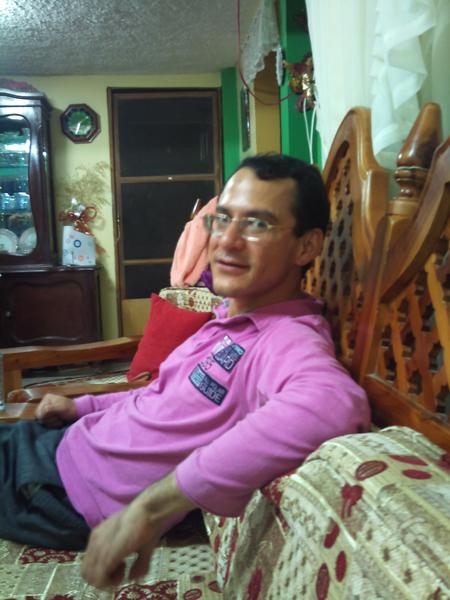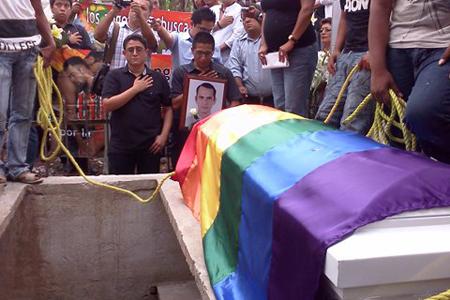
Queer activist Quetzalcóatl Leija Herrera was beaten to death on the morning of May 4. Credit: Xtra files
Chilpancingo – aka Chilpo – is a bit like Barrie, Ontario: most people know it only from the highway signs. At best, folks from Mexico City get as far as the service station on the outskirts of this bustling mid-sized city a few hours south of Mexico’s capital as they head to Acapulco’s beaches. Few see the quaint tree-lined central square or its surrounding historical neighbourhoods, all nestled in a fold in the mountainside above the toll-road interstate.
Last month, however, this backwater state capital earned international headlines after 36-year-old Quetzalcóatl Leija Herrera was found murdered in the central square, a half-block from city hall. He had apparently been beaten in the face with a rock.
Leija Herrera was president of the Centre for Study and Projects on Integrated Human Development (CEPRODEHI) and was an outspoken LGBT rights activist. As part of his work, he organized six Pride marches in the state, reported several homophobic crimes to police and lobbied for legislative change. His murder was reportedly followed in quick succession by three similar murders of gay men under similar circumstances in the same city.
He was killed in the early morning hours of Wednesday, May 4. On the Monday night of the same week he prerecorded a show for the local cable television station about respect for sexual diversity. It aired on Tuesday evening, a few hours before his death. He was reportedly in a bar that night and had asked that the TV channel be changed so that he and his friends could watch the show. Leija Herrera parted company with a friend at about 2:30 am, saying that he wanted to walk through the centre of town on his way home. It was the last time he was seen alive, and many in the gay community say he was killed because of his sexuality and his activist work.
On June 15 I found myself in Chilpancingo. I’m on the board of a human rights organization called Peace Brigades International and was visiting our project office there. Our field volunteers put me in touch with Emiliano García, a CEPRODEHI spokesperson. I met with García (aka Sasha) and José Luquín, who was elected president of the organization in the aftermath of Leija Herrera’s death. They told me about their anger and their fear. And they asked that their story be told.
We met in the early evening in the town’s main square, in front of the McDonald’s. They took me to a local taco stand for a bite to eat. “We are being targeted. Please help us,” said José. The authorities, he said, are not doing enough to address violence against sexual minorities because they are busy focusing on their conflict with drug cartels. “We are living in a situation of no-peace.”
We walked by the bar where Leija Herrera had been a short time before his death. They showed me the route he likely took – about a block and a half to the place where his body was found. I took a photograph of the planter filled with rocks that many say is the likely source of the murder weapon. They told me stories of other sexual minorities who have been attacked or killed in recent years. Those who survive rarely go to the authorities because they expect no assistance. Or worse, police have reportedly threatened gay couples with violence or worse if they don’t leave public areas in the central part of the city.
“Quetza,” as Leija Herrera was known to his friends, worked tirelessly for queer rights, calling for the authorities to pay attention to the epidemic of violence against sexual minorities in Chilpancingo, Acapulco and across the state of Guerrero. Reports indicate that since 2007 at least 125 homophobic murders have been perpetrated in the state, which has a total population of less than four million, making it one of the most dangerous places for queer people in Mexico. Shortly after his death, Leija Herrera’s mother gave an interview to a local newspaper, in which she lamented the widespread impunity of those who commit these crimes.
Shortly after the murder, a half-dozen gay activists gathered in García’s downtown bachelor apartment to share the pain and anger they were feeling. It was there that Luquín was asked to be president. He told me he accepted the role in honour of Leija Herrera’s memory. That night they planned a march for the May 17 International Day Against Homophobia to commemorate their friend. They told me they plan to continue to work for policy change for queer rights in Guerrero and are moving ahead on a legislative proposal for recognition of same-sex partnerships.
On June 21, officials at the state’s Office of the Attorney General announced that they had determined that another gay man was responsible for Leija Herrera’s death. They said they had identified the suspect on video captured by a bank surveillance camera, that the man was seen arguing with Leija Herrera prior to his death. The authorities reported that there were “personal differences” between Leija Herrera and his accused killer, Manuel Alonso Sandoval, aka “Angel,” and they concluded that homophobia was not a factor in the case. They are reportedly searching for Sandoval and a second individual they say they believe was involved in the killing.
A week earlier, however, investigators told CEPRODEHI leaders that none of the many video cameras in the downtown area had captured anything. The day following the government’s announcement, CEPRODEHI issued a public statement asking, “How many more Quetzalcoátls does the justice system and civil society need in order to realize that homophobia exists in our state?” They questioned the attorney general’s conclusion that this matter was merely a conflict between gay men.
The queer rights organization underlined that this murder is one of a series and that there has been insufficient investigation of hate crimes against members of the queer community. “Homophobia is the product of intolerant, undemocratic and backwards societies and often results in the termination of the lives of sexual minorities,” reads a statement.
Noting that Leija Herrera was a recognized leader in his community, CEPRODEHI called on the attorney general to launch a more professional analysis of the series of murders and to avoid making conclusions based on discrimination and homophobia. They called on the state to investigate all aspects of this case, including another attack on Leija Herrera a month prior to his death and similar crimes reported over the past year. They also proposed that the state seek assistance from experts on homophobia-motivated crimes.
Early in June, the Organization of American States approved a resolution condemning discrimination on the basis of sexual orientation and gender identity and called on countries in the Western hemisphere to adopt measures to prevent, sanction and eradicate acts of violence against sexual minorities. It also invited states to assure adequate protection to human rights’ defenders.
During my visit to Chilpancingo, however, I met another local gay man who holds little hope that the state can be counted on to protect queer people. He wonders if the state authorities themselves might be involved in the violence against sexual minorities there. Afraid for his own well-being, he asked to remain anonymous. And while gay marriage is the law of the land in Mexico City, it is clear that the Mexican state has work to do to protect its own queer citizens from violence.
Before his death, Leija Herrera said that we all need to keep on fighting for the right to love in accordance with our own personalities, for the freedom to be ourselves. He said he believed we are starting to construct a society based on inclusion and equality in which women, indigenous people, queers, youth and older people will be valued and considered as equal to others. “A world in which many worlds fit,” he said. Sadly, there wasn’t enough room for him.

 Why you can trust Xtra
Why you can trust Xtra


